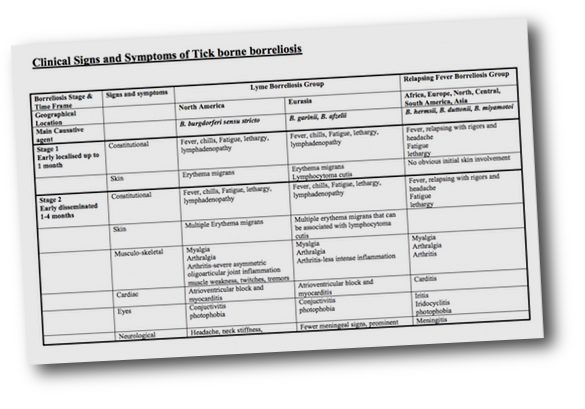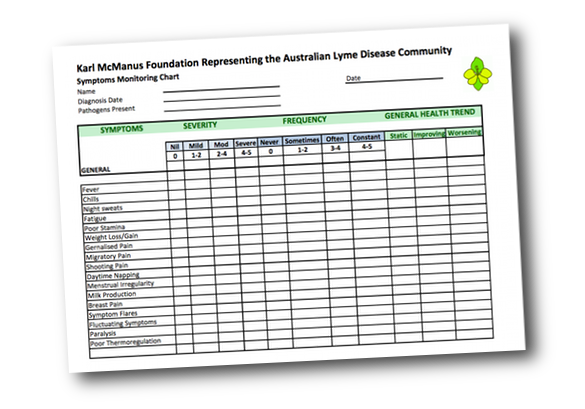Some ticks can carry diseases, which can be passed on after a tick bite. Tick-borne diseases can cause a variety of symptoms and can develop within the first few weeks after a tick bite or many months or even years later.
Borreliosis
The clinical symptoms after tick bite of chronic, stage 3 Borreliosis, Lyme Borreliosis, Relapsing fever) can imitate many chronic diseases including motor neurone disease, multiple sclerosis, Parkinson’s disease, Alzheimer’s, fibromyalgia and chronic fatigue syndrome; all of which are on the rise for reasons unknown.
Borreliosis has many identities around the world. The most recognised tick bite related illness is one that occurs in the east coast of the United States of America called ‘Lyme disease’. Other varieties occur in many territories around the world with Relapsing Fever Borrelia being identified in many developing nations and Reptilian Borrelia. In 2016 a uniquely Australian variety of Relapsing Fever Borrelia was identified by a Western Australian research team.
Borreliosis has a myriad of symptoms. These symptoms can start a week after a tick bite or much later, and include sinusitis, stiff neck, sweat attacks, muscle twitches, muscle weakness, involuntary jerking of limbs, arthritis, Bell’s palsy, cramps, paralysis, depression, brain fog, insomnia, balance problems, light sensitivity, noise sensitivity, optic neuritis, nerve conduction defects, numbness, ECG (cardiac conduction) abnormalities, swallowing difficulties, tinnitus and more.
It can also be asymptomatic (no symptoms), the major determinants being the load and type of bacteria present and the individuals immune status.
Potential symptoms of tick-borne diseases include:
- a red spot or rash near the bite site
- a full body rash
- neck stiffness
- a headache
- nausea
- weakness
- muscle or joint pain and aches
- relapsing fever
- chills
- swollen lymph nodes
- swollen glands
- relapsing- you have good days and bad days

Summary table of the signs and symptoms of Lyme borreliosis.
A detailed look at the signs and symptoms of tick borne illness.

Symptom assessment form and monitoring chart
Download and use this chart to monitor symptoms.
Timeline from acute to chronic
Acute symptoms
Initially after a tick bite you may see a rash around the bite area along with severe itching. The itch and bite area may seem like it will never go away. You may also feel nauseous and very lethargic.
If you have any of these symptoms seek medical advice immediately. If you remain untreated your illness can become chronic which makes it far harder to treat.
Chronic symptoms
If a tick bite is left untreated and you have contracted a tick related illness after 6 months to 1 year it can become chronic. Once this happens the infection has generally left the blood stream and entered the body. Symptoms of chronic tick borne illness include all over body aches and pains, tiredness and chronic fatigue, ringing in the ears, shortness of breath, brain fog and cognitive impairment and can extend to more serious symptoms such as seizures and body function impairment, like paralysis.
REMOVE THE TICK AS SOON AS POSSIBLE!!
If you find a tick attached please remove ASAP, The longer it feeds the greater chance of infection transmission. If you experience any of the symptoms outlined, seek medical advice immediately. A short course of antibiotics may save you from years of suffering. Here is how to approach medical treatment.
Do not tell doctors you think you have Lyme Disease!
Unless you have travelled and been bitten by a tick in the east coast of United States of America it is strongly recommended you do not consider the possibility of a ‘Lyme Disease’ infection. This is so since there is no evidence that the bacteria causing ‘Lyme Disease’ exists in Australian ticks. In 2015 there is developing evidence that Australians suffering from tick borne diseases may be infected with Relapsing Fever Borrelia however the research is incomplete so it is recommended you seek out a doctor who can provide a qualified clinical diagnosis of your condition including consideration of Borreliosis and relapsing fever. Tell the doctor you were bitten by a tick and provide details of all symptoms including ones that seem to have disappeared.
Let the doctor make their own diagnosis and prescribe the antibiotics. If they do not prescribe an antibiotics then you may want to ask why or seek a second opinion. Contact the KMF and we will refer you to a suitable Doctor. ’ Thee Doctors have better understanding of chronic tick borne diseases and may charge above the Medicare levy. If your symptoms persist or relapse and remit persevere with getting medical attention.
Contact the KMF for assistance.. If your GP requests a Lyme disease test which returns a negative result. Remember the negative result does not exclude you from having some other Borrelia infection., What if I am already chronic.
What if I am already chronic.
If it’s been a few years and you have been experiencing symptoms for a long time without knowing what is going on, you are probably just now discovering the possibility you may have a chronic tick borne illness that has been left undiagnosed. Treatment options vary wildly and there is a rabbit warren of information on the Internet.
For chronic treatment recommendations, contact us
